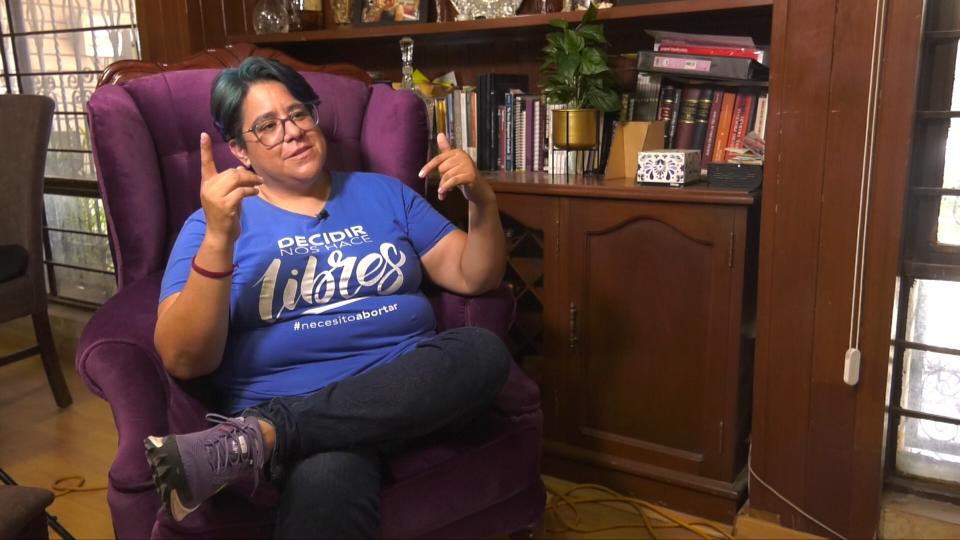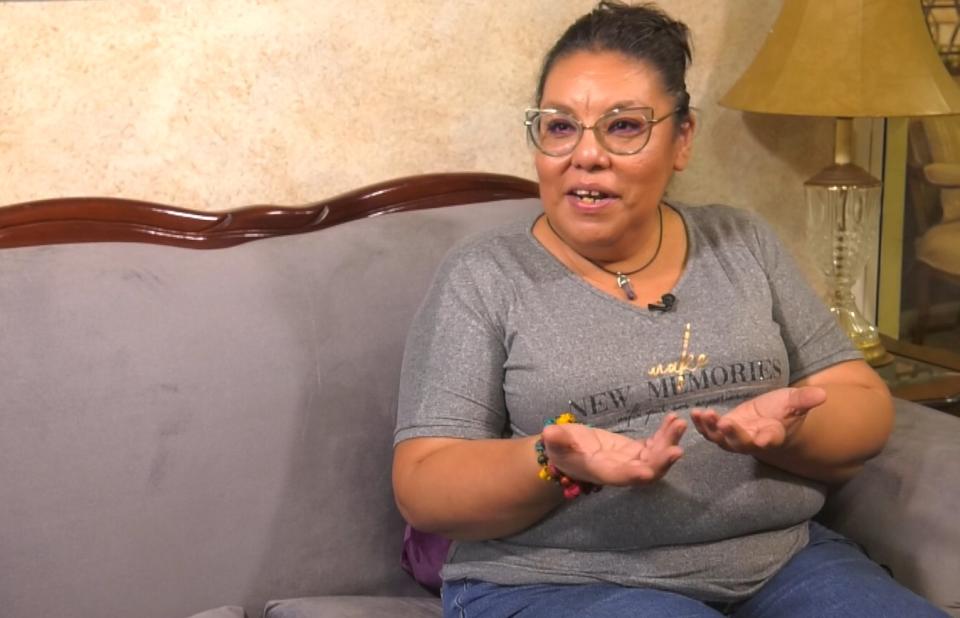'We're here': Mexican groups slam U.S. abortion restrictions as they help more American women
MONTERREY, Mexico — At first glance, it only looks like a roof terrace in a house in Monterrey in the Mexican state of Nuevo León, two hours from the border with the U.S.
It's a small space, with a kitchen and bathroom, called La Abortería, or the abortion place, and it's become a haven for dozens of women and pregnant people — both from Mexico and the United States — who have decided to interrupt their pregnancy with the use of medication.
“You have to talk about abortion as a responsible decision,” said Vanessa Jiménez Rubalcava, one of the space’s founders, in an interview with Noticias Telemundo. “Abortion is a loving and safe decision. It's also a simple medical procedure.”
The abortion center has 17 people who advise and accompany the medically induced abortion processes of some 500 women every month, and it's part of the network Necesito Abortar Mexico, or I Need to Abort Mexico, a project created six years ago to support people who need guidance on abortion.
“It’s about providing all the emotional, physical, economic tools so that women experience an abortion in a dignified manner,” said Ileana Sandoval, a woman who has undergone two procedures with the network's support and who is now part of the project.
This counseling space is the first public place in Mexico that has been created for these purposes, and, paradoxically, it's in Nuevo León, a state where abortion is still a crime, despite the fact that Mexico's Supreme Court declared that it's unconstitutional to criminalize those who undergo the procedure.
“We follow the protocols established by the World Health Organization and by the Mexican Ministry of Health,” said Sandra Cardona, a member of the network. “We use mifepristone and misoprostol as specified by both institutions in [pregnancy] cases that are already in week 12 or 14, and after that to make it safe. We accompany [the women in] these processes, both in person here and through calls and text messages or WhatsApp.”
Cardona and Jiménez Rubalcava said that even before the U.S. Supreme Court reversal of Roe v. Wade, groups and abortion providers in Mexico began to detect an increase in the influx of people contacting them from the U.S.
“Before, I only spoke to two or three people from the United States a year, but since March, they write to us at least seven or 10 a week,” Jiménez Rubalcava said. “It’s a different world, and we believe that demand can continue to grow.”

Members of a network of volunteers, with people in Mexico and the United States, said they are ready to advise and answer questions from U.S. women seeking to have an abortion. According to these organizations' calculations, they have already served some 1,700 people from the U.S. so far this year.
They have established cross-border alliances and drug banks in various regions in the U.S. to meet the high demand for information and abortion medication since the recent U.S. Supreme Court decision.
Many clinics located near the Mexican border are expecting a dramatic increase in patients. As of September 2021, a Texas law prohibits abortions after about the sixth week of pregnancy; before, they were allowed until week 20.
“We are here; they are not alone,” Cardona said. “No one should be left behind, and there should be no women without rights, which is what they are trying to do in the United States. There are no second-class women. It's not possible that in Mexico we already have these advances and there go backwards.”
Mexico’s Supreme Court ruled earlier this year that an underage girl can get an abortion without parental consent if she has been raped. And in May, the southwestern state of Guerrero voted to allow abortions, becoming the ninth of the country’s 32 federal entities where women can legally end pregnancies.
According to Profem, a medical organization that defines itself as helping with the legal interruption of pregnancy in Mexico, 25% of its clientele comes from the U.S. In Monterrey, people who travel from the U.S. buy abortion medications that cost $20 to $150, but at La Abortería they can be free.
Americans seek help amid 'difficult situations'
The Mexican activists say that almost all people seeking help use means such as social networks to contact them and, in many cases, are more than six weeks pregnant. In addition, they often express the fear they feel about what might happen to them legally when they return to their homes in the United States.
"We try to make each one experience abortion in the most dignified way possible," Jiménez Rubalcava said. "I remember the case of a girl from Texas whose doctor wanted to send her to another state that was about 10 hours away, but she preferred to travel to Monterrey, which is only 2 1/2 hours. She also had family here."
"She came with her mother; we were talking and solving all those doubts, and everything went very well," Jiménez Rubalcava said. "In fact, when she returned to Texas, she told me: ‘And now how do I tell my gynecologist, because he knew I was pregnant. I’m very scared.’ And I asked her to tell the truth, that the abortion was done at five weeks, which is legal in Texas, and that’s how it was. But they are new, difficult situations."
Abortion rights activists in Latin America and the U.S. worry that with the recent U.S. Supreme Court decision, the country is one of the few where restrictions on abortions are increasing.
“The case of the United States is an example that women’s rights can never be taken for granted, not even in the Global North. They are rights that must be constantly defended, and permanent actions must be taken to avoid any type of setbacks,” said Cristina Rosero, senior legal counsel at the U.S.-based Center for Reproductive Rights, which advocates for reproductive rights as a human right through a network of attorneys.
During the last 25 years, the global trend has been toward the liberalization of abortion laws, and recently, large Latin American countries have taken steps in that direction, as are the cases of the three most populous nations: Argentina, Mexico and Colombia.
Despite this, Latin America still is one of the most restrictive regions for abortion. Central American countries such as Honduras, El Salvador and Nicaragua totally criminalize abortion, which has resulted in women resorting to unsafe and dangerous procedures, and a criminalization of those who have obstetric emergencies.
Teodora del Carmen Vásquez is a Salvadoran activist who spent almost 11 years in prison after she lost her son in a miscarriage.
"Unfortunately, because I did not have immediate medical assistance, I lost my baby. Besides, I almost died, and then I went to jail," she said. "That is the suffering that affects us women. We are the ones who pay the consequences of these laws so unfair."
Although legal movements in defense of women's rights have achieved the release of 65 women who were detained in El Salvador, there are still four in prison, and the most recent conviction occurred a month and a half ago.
"We are quite concerned about what happens in the United States because it is a bad example. We do not like that what happens here is replicated in other countries," Vásquez said.
Then there are countries where abortion is allowed when the life of the pregnant person is at risk, as is the case in Chile, and in other Latin American countries, other abortion allowances include rape, incest or a fetus that is not viable. Countries such as Costa Rica, Ecuador, Peru and Bolivia, among others, fall into the latter category.
"We have an interesting wave in several of the most representative countries that are moving towards an increasingly broad decriminalization of abortion," Rosero said.
‘Barbaric setback’
The green tide, as the movements in defense of abortion rights are known, have influenced legal changes.
In September, the Mexican Supreme Court of Justice unanimously decided that criminalizing abortion was unconstitutional. Since then, five more Mexican states have moved to legalize abortions. Months later, the Colombian Constitutional Court ruled that abortion was no longer a crime.
Both rulings followed the legalization of abortion by Argentina’s Congress in 2020, meaning three of the four most populous countries in Latin America have accepted abortion rights in recent years.
“In order to achieve the progress in Colombia and Mexico, without a doubt, mobilization has been a key point,” Rosero said. “At least the criminalization of women has stopped a little, the persecution of the issue; they have begun to talk beyond the stigma, but there is still a long way to go.”
Activists like Laura Salomé Canteros see the processes of decriminalization or legalization of abortion as part of the universal demand for human rights, a movement that in countries like Argentina is closely linked to the fall of the dictatorship and the advent of democracy.
“We work a lot from a popular perspective,” Canteros said. “We promote what we call social decriminalization to change society first. The truth is that the right to abortion is sovereignty over the body, over decisions and over life. That is why we achieve demonstrations with hundreds of thousands of people of all ages.”
In Argentina, Law 27,610 legalized access to the voluntary interruption of pregnancy in 2020, establishing that all people with the capacity to gestate have the right to access an abortion until the 14th week. However, women whose cases fall under the grounds of "risk to the health or life of the woman or sexual violence" can have an abortion without a time limit.
"The United States is a barbaric setback, honestly," Canteros said. "But it's also an opportunity to organize and fight in an intersectional way, because that is what the judicial, legislative and executive channels are for. There is a wake-up call for the Democratic Party in the next elections."
Despite recent changes, not everyone in Mexico supports abortion rights. A country that is almost 78% Catholic, according to the 2020 census, there are various organizations that condemn access to the procedure.
"When a woman decides to have an abortion, she's attempting against a life. We propose prevention, education and even contraceptive policies," said Juan Manuel Alvarado, a member of the group Familias Fuertes Unidas por México, which translates to Strong United Families for Mexico, which is against abortion.
"This pro-abortion tourism, it comes in a cascade. It comes massively, and there are no restrictions," Alvarado said.

AActivists like Sandra Cardona are used to hearing criticism from the most conservative sectors of Mexican society. In fact, in many cases they were part of that trend before devoting themselves entirely to the defense of women’s rights.
"I was also one of those closed people because, when I was a teenager, I gathered signatures to criminalize women for having abortions," she said. "First of all, I understand them, but what I tell them is that this decision belongs to each woman, each person with ability to gestate. We do not have to decide on the bodies of other women."
An earlier version of this article was first published in Noticias Telemundo.
Follow NBC Latino on Facebook, Twitter and Instagram.

